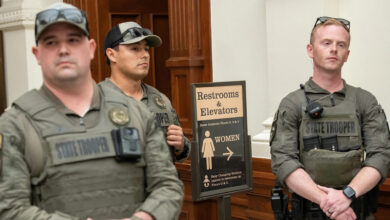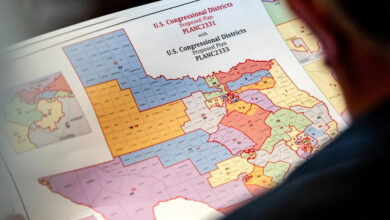
House Bathroom Bill Would Undo Houston, HISD, UH Protections
LGBT advocates fear floor vote on HB 2899
By John Wright
An anti-transgender bathroom bill moving through the Texas House would undo nondiscrimination protections enacted by the City of Houston, the Houston Independent School District, the University of Houston, and other local entities, according to LGBT advocates.
House Bill 2899, by state representative Ron Simmons (R-Carrollton), would bar cities, school districts, and other political subdivisions of the state from enforcing laws that protect a class of people against discrimination by granting them access to multi-occupancy restrooms, locker rooms, or showers.

Simmons is touting HB 2899 as an alternative to Senate Bill 6, the anti-trans bathroom bill championed by lieutenant governor Dan Patrick that would expressly prohibit trans people from accessing restrooms in government buildings based on their gender identity. But LGBT advocates point out that, like SB 6, Simmons’ bill would preempt nondiscrimination laws and policies covering millions of Texas residents and students.
“Ultimately, it seems like Texas is engaged in the same process that North Carolina was engaged in after [they passed House Bill 2], which is trying to figure out how much discrimination is the right amount for Texas,” said Kathryn Oakley, senior legislative council for the Human Rights Campaign, referring to the 2016 anti-trans bathroom bill that cost the Tarheel State’s economy hundreds of millions of dollars.
“The truth is, the only acceptable amount of discrimination is none,” Oakley added. “There can be no compromise when it comes to these issues.”
Thanks to the repeal of the Houston Equal Rights Ordinance, the Bayou City has no law prohibiting discrimination based on gender identity in employment, housing, and public accommodations. However, LGBT advocates said HB 2899 would undo former mayor Annise Parker’s LGBT-inclusive 2012 executive order prohibiting discrimination against municipal employees and at city-owned facilities. Perhaps more significantly, HB 2899 would undo HISD’s 2011 nondiscrimination policy protecting trans students. With more than 200,000 students, HISD is the seventh-largest school district in the nation.
Both HISD officials and current Houston mayor Sylvester Turner have come out against HB 2899.

“This legislation fulfills no useful purpose, and would only harm: harm cities’ ability to self-regulate, harm the reputation of the State, and harm the transgender men, women, and children who live here,” Turner said in written testimony opposing the bill. “The passage of the HB 2899 would send a loud and clear message: Texas is not a welcoming place.”
Turner submitted his testimony to the House Committee on State Affairs, which held a hearing on HB 2899 in the early-morning hours of April 20. As of press time, the committee hadn’t voted on the bill—but LGBT advocates feared HB 2899, which has the backing of governor Greg Abbott, would eventually make its way to the House floor.
“It’s urgent right now that people pay attention,” said Kathy Miller, president of the pro-LGBT Texas Freedom Network. “We’re hearing from highly placed and powerful House members that they are eager to find some kind of compromise on bathroom legislation, so that far-right members of the Legislature can go back to their districts and say they voted in support of at least one discriminatory measure.”
“We have five weeks left in our legislative session to defeat these bills,” Miller added. “We hope everyone in Texas and across the country will help us do that.”
HB 2899 is one of at least three anti-LGBT proposals—out of roughly two dozen filed in the 85th Legislature—that pose a significant threat of becoming law, according to Chuck Smith, CEO of Equality Texas. Both SB 892 and HB 3859 would allow adoption and foster care agencies to discriminate against LGBT people—such as by refusing to place children with same-sex couples—if they have religious objections. And SB 522 would allow county clerks to refuse to issue marriage licenses to same-sex couples, and instead refer them elsewhere if they have religious objections.
In April, San Antonio tourism officials released a study showing that if anti-LGBT legislation passes, it could cost Texas $3.3 billion in annual tourism losses, and more than 35,600 full-time jobs associated with leisure travel and conventions. Last fall, a study from the Texas Association of Business—the state’s chamber of commerce—found that anti-LGBT legislation could cost the state up to $8.5 billion over three years.
Houston’s Rebecca Robertson, legal and policy director for the American Civil Liberties Union of Texas, suggested that if anti-LGBT legislation passes, it would also land the state in court. Robertson said Republican lawmakers behind the bills have “a shocking disregard for our Constitution and for the fundamental freedoms that define American democracy.”
“Many of the two dozen anti-LGBT bills are utterly inconsistent with federal civil rights laws that bar discrimination on the basis of sex,” Robertson said. “Others blatantly ignore the principle embodied in the Equal Protection Clause of the 14th Amendment. And still others would violate the Establishment Clause of the First Amendment by creating special rights that allow people who adhere to favored religious beliefs to impose those beliefs on others who may not share them.”










